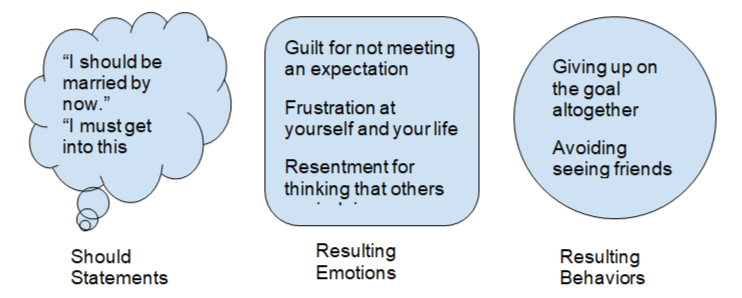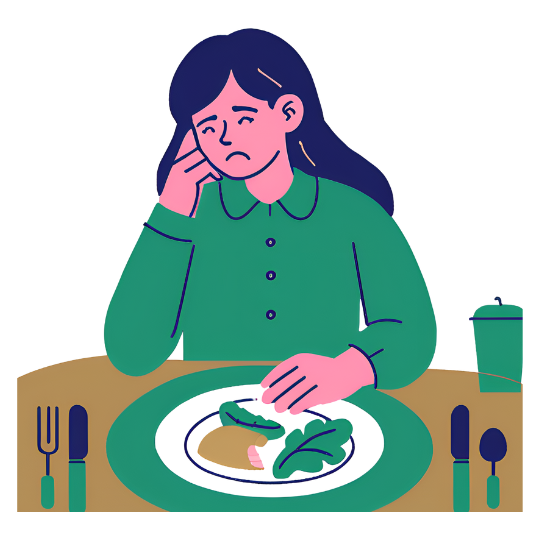
“Should” statements are negative and unhealthy thinking patterns. Should statements are thoughts that you make to yourself about what you and others “should” or “ought” to do.
We all have these “should” statements in our heads. At times, we tell ourselves things like “we should get started early on this project” or “we should do laundry” which are normal. It motivates us to get things done quickly and effectively. However, when we use “should” statements too often in our lives, especially for things we do not have control over, it can contribute to more stress, anxiety, and depression in our lives.
When unchecked, “should” statements can be a type of negative and unhealthy way of thinking where you tell yourself that things “should be” the way you hoped or expected to be. This is considered a cognitive distortion, or a negative and incorrect way of thinking because this “should” statement creates a rigid criteria for yourself and others. It sets one up for failure as they can create unreasonable expectations of yourself and the people around you.
Examples of “should” statements:
“Should” statements are when we impose an expectation on ourselves and others. “Should” statements are absolutes. They are rules we must follow – sometimes at any cost. This can have undue influence on our emotional and mental well being and can impact our relationships and our sense of self-esteem negatively. Have you ever said any of these statements to yourself in the past?
“I must get into this college or else.”
“I should be able to handle this problem.”
“I should be making x amount of money this year.”
“I should be this weight.”
“My boss must promote me by the end of this year.”
“My son must get into this college.”
“I should be married by now.”
“Should” statements that are directly against yourself can lead to guilt and frustration. “Should” statements that are directly against other people can lead to anger and frustration.
“Should” statements can be a damaging distortion because it lacks compassion on yourself and others and leads to avoidance behaviors.
When we use “should” statements, we often feel guilty that we cannot live up to the expectations that we set upon ourselves – and usually these are unrealistic expectations. When we use “should” statements” on others, we are generally disappointed with their ‘failure’ to meet your expectations.
How “should” statements can lead to self-sabotaging behavior:

Let’s take Anna as an example. Anna is a bright, 32 year old woman who has been very focused on her career. Because of her career, she has not been able to focus much on dating.
Whenever she goes home to family events, her parents and relatives will ask her about her relationship status and will ask her ‘when will you get married? Why aren’t you married yet?” Anna leaves these family events thinking to herself: “I should be married by now. I am a 32 year old unmarried woman without kids but have no romantic prospects.”
Her automatic thoughts led her to feeling disappointed in herself as well as resentful towards her relatives for asking this question. Because of these automatic thoughts and feelings, she begins to avoid family functions as much as possible. She considers even giving up on dating because she thinks to herself: “I ‘should’ be married by now but I’m not,” potentially leading to feelings of hopelessness. Why bother?
We need to reframe “should” statements to allow ourselves and others more compassion and freedom.
How to break free from “should” statements in your life:
If you find yourself using “should” statements frequently with yourself and those around you, don’t despair – there are ways to break free from these arbitrary, inflexible rules you are setting upon yourself:
Write down all your “should” statements that come to you during the course of the day.
Any time you have a “should” statement enter into your mind, write it down as well as maybe why it popped into your mind at that time. After you’ve done some journaling about this over the course of a week or two, take a look and see why you’re having these “should” statements. Are you thinking these thoughts when you are stressed or in certain environments?
Explore the deeper reason behind the “should” statement.
For example, if you wrote down, “I should be married by now” try and understand why you think this. Is it because you think that you will not be able to find a suitable partner after a certain age? Is it because your parents have been pressuring you? If you wrote down, “I should get into this college” ask yourself why? Is it because you are afraid you will not have a successful future if you do not? Try and write down the deep, underlying reasons behind these “should” statements.
Try and find opposing evidence for your “should” statements.
Going back to the original examples of “I should be married by now” and “I should get into this college” you can start by thinking about and searching for opposing evidence. What about all the people in the world who are much older and entered into successful marriages much later in their lives? What about all the successful people who graduated from the thousands of different colleges out there?
Revise your “should” statement and create a more balanced one:
“I would like to be married but it is okay if I don’t meet the right person.” or “I hope to get into this college but it is okay if I also get into these other schools.” This takes off undue pressure on you and not let it have total control over your emotions.
How “should” statements can sabotage our relationship with God and our fellow Christians:
Christians can also be susceptible to “should” statements in their lives, where they impose rules on themselves and those around them which causes them to feel guilt all the time or judge others harshly. Of course this isn’t to say we shouldn’t try to do what is right and follow the Ten Commandments that God has provided us with. We definitely, absolutely should not kill, steal, bear false witness, worship other gods and so on.
However, God did not send His beloved Son to the cross just so that we can constantly feel guilty all the time, or make others feel guilty all the time. He did not give us a renewed life to live our lives racked with guilt and shame. He gave us a new life so that we may fully embrace the good news of the gospel and share the good news with others. How can we possibly share the good news with others if we are so focused on the shortcomings of ourselves and others?
If we constantly feel guilty all the time and beat ourselves up, we may start ignoring and rebelling against these feelings of guilt that we have. We may lose hope and forget what the true message of the gospel is about. If we constantly judge others all the time and make them feel guilty, perhaps we may prevent and discourage someone from coming to church and enjoying fellowship.
How do we practice and show grace instead?:
Get to know others and choose compassion:
If we take a genuine interest in others, ask questions about their lives and their families, and actively try to learn about them, perhaps we can begin to care about them and find ways to be compassionate towards them.
Be careful with your words:
The Bible is filled with reminders about why a kind word goes a long way (Proverbs 16:23-24 and Proverbs 12:25) and how wise followers of Christ will take care to not wound others with their tongue. If we are constantly rebuking others for their shortcomings, we should take a pause and ask ourselves if we can go about this in a more compassionate and caring way.
Practice gratitude:
If we focus on counting our blessings rather than thinking about the shortcomings in our lives and those around us, we will be more prone to view the world positively and take notice when God blesses us.
We hope that this post encourages us to be kinder to ourselves, and be gracious to those around us.
Enjoyed our blogpost? Subscribe to our newsletter for more resources on mental health and integrating the Gospel message in your healing journey.
If you found our resources useful, please consider donating to Oak Health Foundation, which is a 501(3)c nonprofit dedicated to providing resources regarding holistic mental healthcare and subsidized treatment for those in need.




